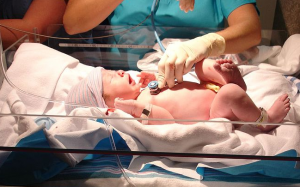
With Mexico placing a distant 2nd with an average fertility rate of 2.2 children per woman and France, the U.S., Britain, the Netherlands, and Spain fairing less than 2 per woman, Israeli women have 3.1 children on average.
By Maytal Yasur Beit-Or
Some 186,000 babies were born in Israel over the course of 2016, including 7,676 twins and 261 triplets, data from the country’s maternity wards shows. On average, a baby is born in Israel every three minutes, and a cesarean section is performed every 20 minutes.
These figures, and many others, were presented at the annual conference of the Israeli Society for Maternal and Fetal Medicine, which looked at the country’s 26 hospitals and discovered that the average fertility rate in Israel is 3.1 children per woman, the highest among Organization for Economic Cooperation and Development member-nations. Mexico placed a distant second with an average fertility rate of 2.2 children per woman, and the average fertility rate for countries like France, the U.S., Britain, the Netherlands, and Spain is less than two.

A newborn baby – Photo: Indrani/Wikimedia Commons
The average age at which women in Israel have their first child is rising, and for 2016 stood at 28.3. Births by mothers under the age of 19 are uncommon in Israel, comprising only 0.5% of births, whereas mothers over age 45 accounted for 3.52% of births.
A total of 4.5% of births were multiples (twins and triplets). Among women age 45 and older, most of whom used donor eggs to become pregnant, the rate of twins is four times higher, accounting for 17.8% of births among women in that age group, which also has a higher than average rate of premature births, before the 33rd week of pregnancy. Nearly 7% of mothers in that age group gave birth prematurely, compared to an average premature birth rate of 1.25%.
Professor Ariel Many, chairman of the Israeli Society for Maternal and Fetal Medicine and head of the labor and delivery rooms at Sourasky Medical Center in Tel Aviv, said that “there is a dramatic increase in the number of multiple embryo pregnancies among women age 45 and older, and this plays a significant role in terms of health problems for the mothers, like the risk of high blood pressure, gestational diabetes, even emergency hospitalizations.
“We have a lot of work to do in the field, and the current protocol is to implant only one embryo for women up to the age of 30 who are undergoing fertility treatments or using egg donors when the donor is under 30. This can reduce the chances of these complications. I hope that next year’s data will show a drop [in complications],” Many said.
Meanwhile, efforts to reduce the number of cesarean sections performed in Israel are bearing fruit. In the past five years, the number of cesarean births has been on the decline, and in 2016 only 17.8% of births (28,589) were performed through cesarean sections, compared to 27% in the OECD.
Slightly over 6% of births in 2016 required the use of medical tools, and of these some 95% were vacuum births. Labor was induced in 15.6% of mothers, and 18.3% of mothers underwent episiotomies. In one hospital, 48% of mothers underwent episiotomies, while in other hospitals fewer than 10% of mothers did.
Mani also noted that fewer mothers were receiving epidurals during birth, with 46% of mothers who gave birth in 2016 using this pain control method, a drop of 5% in the space of a decade, although the rates of epidural use vary from hospital to hospital.
In 2016, the miscarriage rate in Israel stood at 3.28 cases per 1,000, and the number of infants who die in birth stood at 0.14 per 1,000 births. Israel has a lower miscarriage rate than the average in OECD nations, where the number stands at 4 per 1,000.
View original Israel Hayom publication at:
http://www.israelhayom.com/2017/11/13/israel-boasts-highest-fertility-among-oecd-nations/






 Israeli New Shekel Exchange Rate
Israeli New Shekel Exchange Rate